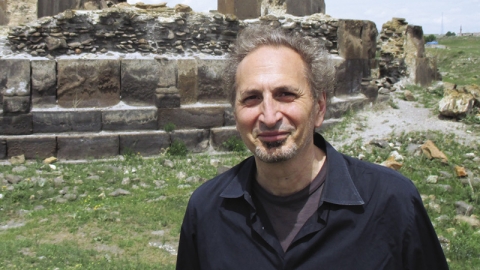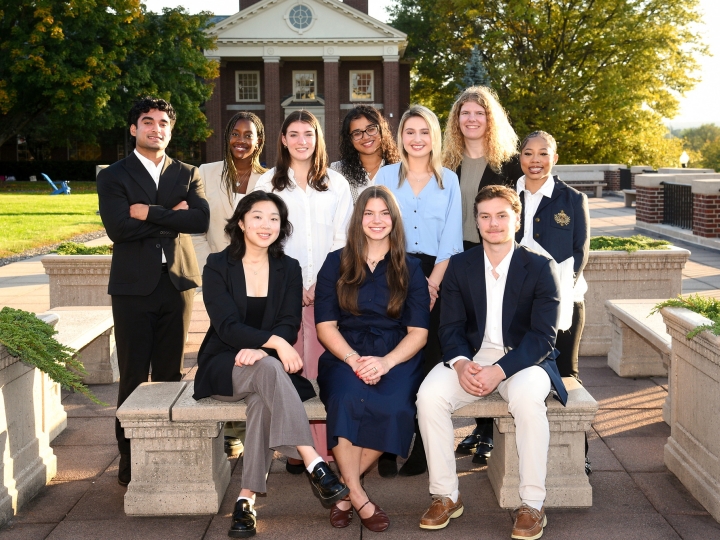
Excavating Trauma
October 9, 2015
Peter Balakian '73 at the medieval Armenian church in Ani, Turkey.
Peter Balakian '73 sifts through the desert sands to quash denialism of the Armenian genocide a century ago.
By Matt Zencey
For poet, essayist and Armenian genocide scholar Peter Balakian '73, this spring was what you might call a career moment.
He published two books — Ozone Journal, his seventh book of poetry, and Vise and Shadow: Essays on the Lyric Imagination, Poetry, Art and Culture, containing more than two decades of his essays. Meanwhile, the world media clamored for his views on the 100th anniversary of the genocide against Armenians in Turkey, a holocaust whose victims included most of his mother’s family.
A professor of humanities and English at Colgate University, where he has taught since 1980, Balakian came to international prominence with Black Dog of Fate, a 1997 best-seller about his Armenian heritage and what happened to his family during the genocide (a monumental crime that the Turkish government steadfastly denies to this day). In 2003, he took a more comprehensive look at that brutal chapter of history in The Burning Tigris: The Armenian Genocide and America’s Response.
As the world marked the centennial of the genocide, (generally understood to have started on April 24, 1915), Balakian was much in demand.
He published commentaries in the Los Angeles Times, The Guardian and Salon.com, did many media interviews, including National Public Radio and CNN, and lectured at universities across the country. "The past six months have been almost overwhelming," he said in August.
Though on the road frequently, he continues to teach full time. "I’m happy to say I’ve not missed a class, though one does have to reschedule classes from time to time," he says.
Despite the challenges of juggling the many demands for his limited time, he says, "The outpouring of coverage for the Armenian genocide 100th anniversary worldwide has been heartening and stresses the need for Turkey to come to terms with it."
Balakian came to his family’s tragic history through his grandmother, a feisty pipe-smoker who loved the New York Yankees. However, it required some detective work.
When his grandmother was young, she and her two young daughters were among the few survivors of a monthlong death march in which the Turks forced masses of women and children through scorching desert heat into what is now Syria. But neither his grandmother nor his aunts talked about surviving that horror.
As he was growing up in northern New Jersey, Balakian says, the family took "a lot of pride in Armenian culture” — they went to an Armenian Church — "but the genocide, yes, it was hushed over."
In Black Dog of Fate, he writes that his Aunt Gladys admonished him with an Armenian saying, "When the past is behind you, you keep it there."
That repression, Balakian says, is part of how survivors and their families deal with mass trauma. The survivors usually refuse to talk about it, and their children learn not to bring up the sensitive subject. The family history comes out, Balakian says, when the third generation — his — "comes along with the excavating tools."
A major theme in his life, he says, has been "decoding the encoded messages of trauma" inflicted on his grand-parents’ generation.
In his case, the key that broke the code came when he discovered the legal papers his grandmother had filed seeking compensation for all the property stripped from the family during the genocide.
In Black Dog of Fate, Balakian recounts how a relative was pulled from his home by Turkish soldiers, and the family found his remains dumped on their doorstep. He had been beheaded, with his arms nailed to a board like a cross and horseshoes nailed to his feet, his genitals mutilated.
He was just one of many Armenian men systematically rounded up and killed, while the women and children, including his grandmother and aunts, were forced to endure brutally hot death marches. The marchers had no food or water and were attacked by anti-Christian mobs and abused and raped by the Turkish gendarmes supposedly accompanying them for protection. U.S. reports from the time say some survivors straggled into Aleppo, naked and skeletal. When the Turkish extermination campaign ended, nearly 1.5 million Armenians had perished.
In 2009, Balakian visited Der Zor, a massacre site in modern-day Syria, and sifted through the desert sands, feeling for bleached fragments of Armenian bones — a scene included in the title poem of his latest volume.
A century after the atrocities, Turkey has yet to admit to genocide. The most Turkish officials will say is that the government recognizes Armenians suffered in the inevitable chaos of World War I, just as Turks and many other ethnic groups in the former Ottoman Empire did.
Though some Turkish intellectuals can now speak the truth about the genocide without going to jail, and Balakian’s books on the subject are available in Turkey, Balakian says the government steadfastly maintains its denialist stance.
"Turkish consular offices in the U.S. still send their spokespeople to lectures that I give, to parrot the state line," he says.
The U.S. government can’t bring itself to join the other nations that have officially recognized the genocide. Repeated efforts to pass resolutions on the topic in Congress have failed as Turkey threatened retaliation, including potential closure of strategically valuable U.S. military bases there.
That deference to Turkey’s denialism is especially disappointing to Armenians, given the U.S.’s historical concern for their suffering.
When the genocide was underway, U.S. officials documented the carnage and led the world’s cries of outrage. Americans responded by organizing huge humanitarian relief efforts.
By the mid-20th century, Turkey had become a valuable U.S. ally, sitting near the Mideast’s huge oil deposits and providing a vantage point on what was then the Soviet Union. According to some critics, the price of geopolitical cooperation has been to keep quiet about the Turks’ genocidal treatment of Armenians.
While the genocide is a common theme in Balakian’s work, he is foremost a poet and literary critic. In Black Dog of Fate, he writes that his research into the genocide was "inseparable from poetry. Poetry was part of the journey and the excavation."
His latest poems cover terrain that includes New Mexico, Nairobi and Tehran, and depict figures such as artist Andy Warhol, poet Hart Crane and boxer Joe Louis.
Balakian credits Bucknell for starting him on his life’s path. He connected with Jack Wheatcroft ’49, an "inspirational and brilliant teacher and an amazingly versatile writer," who became his mentor and lifelong friend. He co-dedicated his 2001 volume of poetry, June-tree, to Wheatcroft. (The Bucknell connection runs deep. Balakian’s mother, Arax Aroosian ’48, and son, James ’10, are graduates.)
While at Bucknell, Balakian dabbled in painting "in my own amateurish way" and graduated a course short of a double major in art history. "The visual arts have always been a big part of my writing life," he says.
That connection is displayed in his 2015 essay collection Vise and Shadow. Compiled from work covering more than two decades, the volume offers views prompted by the works of artists and writers including Arshile Gorky, Theodore Roethke, Primo Levi, Bob Dylan and filmmaker Elia Kazan.
At times, Balakian seems a tad uneasy with the renown that comes from writing about the Armenian genocide. He says his poetry sells pretty well, by poetry standards, but his memoir sold more in one week than all his books of poetry had to that point. Seeing that, he says with a wry note in his voice, "the poet realizes something’s wrong with the world."
Speaking on the intersection of art and politics, he told The Cortland Review in 2003, "The political sphere should deepen a writer and make his or her work larger, richer and morally resonant." However, he added, "Poetry must be faithful to the richness of language, poetic form and the complexity of experience."
His latest poetry book, Ozone Journal, won high praise this spring from The Literary Review, which wrote, "Balakian is blessed with an eerie ability to connect seemingly unrelated events separated by vast amounts of time and space."
In the title poem, Balakian writes: "Gorky said, take a flat brush / and work it till there are two hairs left."
After a lifetime of painting with words, Balakian still has many hairs left in his brush.
Matt Zencey is a freelance writer who lives in West Chester, Pa.

